Cantaloupe, a delicious and juicy fruit that is loved by many, belongs to the Cucurbitaceae family. As a member of this gourd family, Cantaloupe benefits greatly from using fertilizers. Fertilizers provide essential nutrients that are necessary for its growth and development. These delicious fruits belong to the muskmelon family and require proper nourishment. You may experience stunted growth, poor fruit quality, or crop failure without adequate fertilization.

Cantaloupes have specific nutrient requirements that must be met for optimal results. Nitrogen (N), phosphorus (P), and potassium (K) are essential elements needed in relatively large quantities. They contribute to leaf development, root establishment, flowering, and plant vigor. In addition to these macronutrients, Cantaloupes also benefit from other micronutrients such as magnesium (Mg), sulfur (S), zinc (Zn), and boron (B).
These nutrients play an important role in various metabolic processes within the plant. By fertilizing Cantaloupe plants, you can enhance their overall health and vigor. The right balance of nutrients promotes strong root development, robust foliage growth, and increased flower production. This ultimately leads to higher yields of deliciously sweet Cantaloupes.
Best Fertilizer for Cantaloupe
Organic Fertilizers for Cantaloupe: Benefits and Recommendations
One of the best organic fertilizers for Cantaloupes is compost. Compost enriches the soil with essential nutrients, improves its structure, and enhances water retention. Adding compost to your garden beds or mixing it into potting soil can create an ideal growing environment for your Cantaloupe plants. Seaweed extracts are another fantastic option for organic fertilizers for Cantaloupes. Packed with micronutrients like potassium, magnesium, and trace elements, seaweed extracts stimulate root development and enhance plant disease resistance.
In case you missed it: How to Grow Cantaloupe Faster: Best Tips to increase Flowering, Fruiting, and Production Yield
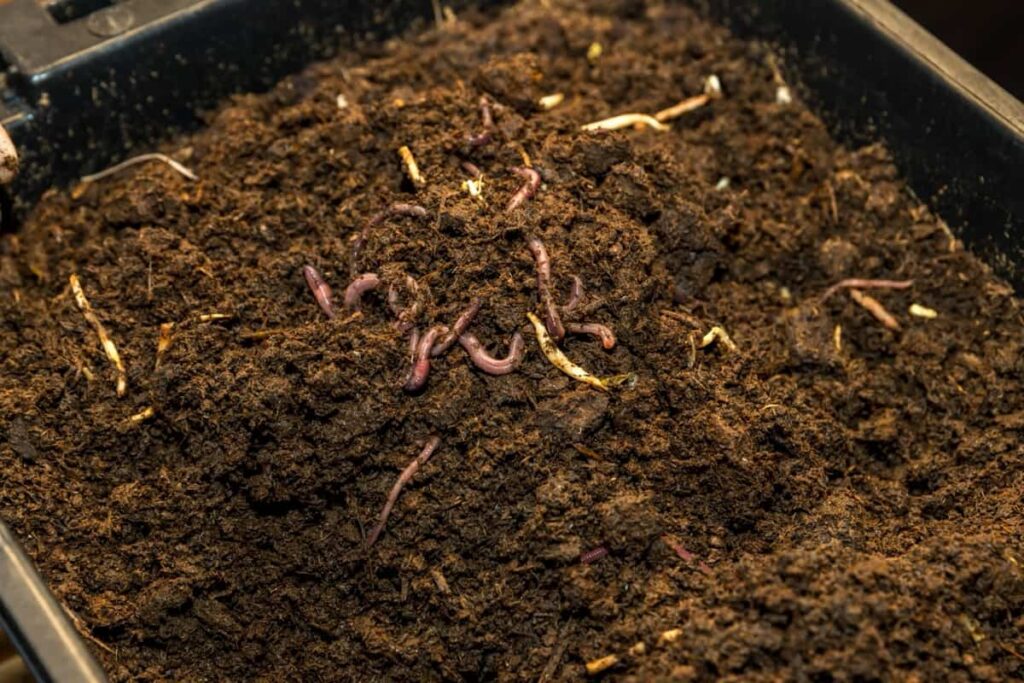
Natural Fertilizers for Cantaloupe: Enhancing Soil Health and Crop Yield
When fertilizing your Cantaloupe plants, natural options can be a great choice. Not only do they enhance soil health, but they also contribute to an increased crop yield. Compost improves soil structure and adds essential nutrients that promote healthy plant growth. It helps retain moisture and encourages beneficial microbial activity in the soil.
Fish emulsion is another fantastic choice. Rich in nutrients like nitrogen and phosphorus, fish emulsion quickly boosts your plants’ growth while improving overall soil fertility. Bone meal is another natural fertilizer that can be used as a source of phosphorus for your Cantaloupes. Phosphorus promotes robust root development and flowering in plants.
Homemade Fertilizers for Cantaloupe: Cost-effective and Environmentally Friendly Options
One popular homemade fertilizer for Cantaloupe is compost tea. This nutrient-rich fertilizer is made by steeping compost in water for some time. It provides nutrients to your Cantaloupe plants, improves soil structure, and promotes beneficial microbial activity. Another great option is banana peel fertilizer. Don’t throw away those banana peels. Instead, chop them up into small pieces and bury them around the base of your Cantaloupe plants.
The peels release potassium, phosphorus, and other important minerals as they decompose. Epsom salt is another handy ingredient that can be used as a natural fertilizer for Cantaloupes. Rich in magnesium and sulfur, Epsom salt can enhance fruit quality and sweetness when applied sparingly around the plants.
If you’re looking for an easy-to-make liquid fertilizer, make comfrey tea by steeping comfrey leaves in water for a few weeks. This homemade brew is high in nitrogen and nutrients for healthy plant growth. Coffee grounds can be repurposed as a nutritious fertilizer for your Cantaloupes. Sprinkle the grounds around the base of the plants or mix them into the soil to provide nitrogen and other trace minerals.
NPK Ratio for Cantaloupe Fertilization: Finding the Right Balance
One important aspect to consider is the NPK ratio, which stands for nitrogen (N), phosphorus (P), and potassium (K). For Cantaloupes, a balanced NPK ratio of 5-10-10 is often recommended. Nitrogen plays a key role in promoting vegetative growth and lush foliage. Phosphorus helps with root development and flowering, while potassium contributes to plant health and disease resistance. By providing these essential nutrients in the correct proportions, you can ensure that your Cantaloupe plants grow strong and produce abundant fruits.
In case you missed it: Best Fertilizer for Mango Trees: Organic, Natural, Homemade, NPK Ratio, and Schedule
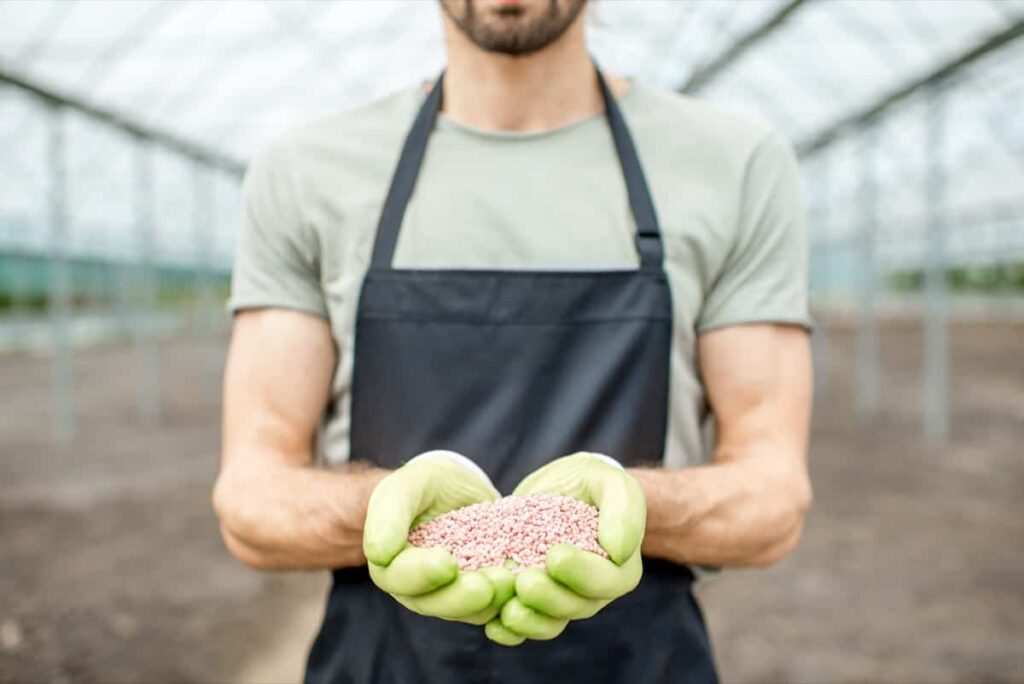
Remember, achieving the right NPK ratio for fertilizing Cantaloupes requires careful consideration of various factors such as soil composition, plant stage, environmental conditions, and crop requirements. Considering these factors will help you find the perfect balance to support healthy growth and bountiful harvests without overloading your plants with unnecessary nutrients.
Essential Nutrients for Cantaloupe Plants: A Comprehensive Guide
To ensure healthy growth and abundant harvests, it is crucial to provide Cantaloupe plants with the essential nutrients they need. These nutrients are vital in plant development, from root establishment to fruit production. Nitrogen (N) is the key macronutrient that Cantaloupes require. It promotes vigorous foliage growth and helps in chlorophyll production, which aids photosynthesis. Phosphorus (P) supports root development and flowering, while potassium (K) enhances plant health and improves fruit quality.
In addition to these primary macronutrients, Cantaloupes also benefit from secondary macronutrients like calcium (Ca), magnesium (Mg), and sulfur (S). Calcium strengthens cell walls and prevents diseases such as blossom end rot. Magnesium is essential for chlorophyll synthesis, enzyme activation, and energy transfer within the plant.
In case you missed it: 14 Best Grape Fertilizers: Top Organic Grape Vine Fertilizers Along With Price
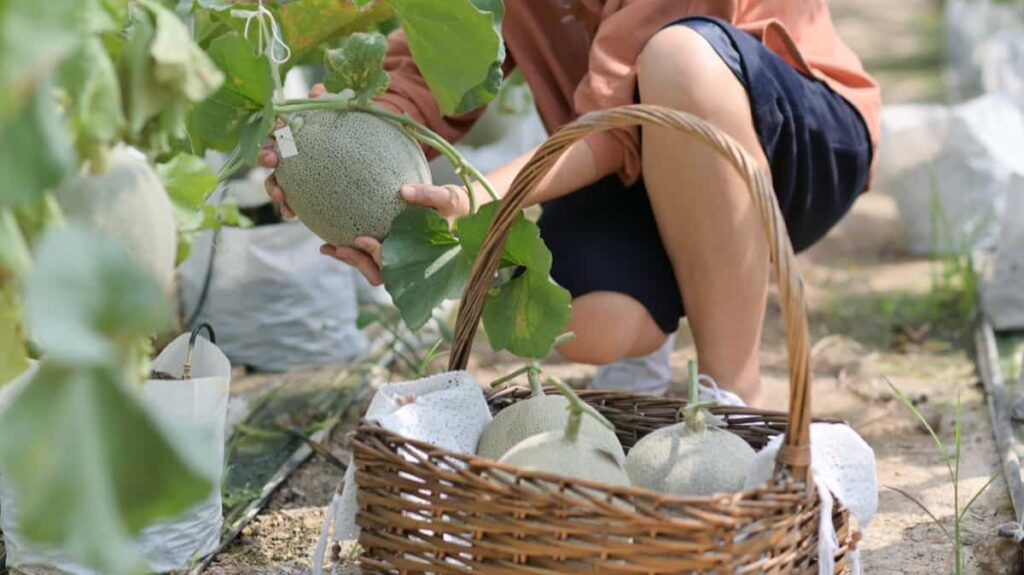
Sulfur contributes to protein formation and plays a role in nutrient uptake. Furthermore, micronutrients are equally important for optimal Cantaloupe growth. Zinc (Zn), manganese (Mn), copper (Cu), iron (Fe), molybdenum (Mo), boron (B), and nickel(Ni) all have specific functions in various physiological processes such as enzyme activation or electron transport.
Best Time to Fertilize Cantaloupes: Establishing an Effective Schedule
Typically, the best time for fertilizing Cantaloupes is during June and July when you start seeing more flowers in bloom. This is because these flowers will eventually develop into delicious melons. By providing fertilizer at this stage, you’re giving your plants a boost of essential nutrients precisely when they need it most.
During this period of active flowering, your Cantaloupe plants are undergoing rapid growth and development. They require extra nutrients to support their energy needs and ensure healthy fruit formation. Fertilizer application during this critical stage can significantly enhance crop yield and quality.
Slow-release Fertilizers for Cantaloupes: Long-lasting Nutrient Supply
These fertilizers provide a long-lasting supply of nutrients, ensuring that your Cantaloupe plants receive the essential elements they need for healthy growth and abundant fruit production. One advantage of using slow-release fertilizers for Cantaloupes is that they release nutrients gradually over time, so you don’t have to worry about constantly applying fertilizer.
This saves you time and reduces the risk of over-fertilization and nutrient leaching. Slow-release fertilizers come in various forms, such as coated granules or pellets. These coatings are designed to break down slowly, allowing the nutrients to be released gradually into the soil where the Cantaloupe plant roots can absorb them.
Moreover, using slow-release fertilizers helps reduce nutrient runoff and leaching, minimizing environmental impacts. Supplying nutrients at a controlled rate based on plant needs rather than applying large doses simultaneously can minimize excessive nutrient loss from your garden or farm.
Liquid Fertilizers for Cantaloupes: Quick Absorption and Rapid Growth
Liquid fertilizers are an excellent option for nourishing Cantaloupe plants and promoting rapid growth. These fertilizers are specially formulated to be easily absorbed by the plant roots, providing quick access to essential nutrients. The main advantage of using liquid fertilizers for Cantaloupes is their fast-acting nature. Since they are in a liquid form, the nutrients are readily available for uptake by the plants, allowing them to absorb what they need for optimal growth quickly.
Liquid fertilizers also benefit from being easily applied directly to foliage or to the soil of your Cantaloupe plants. This makes them convenient and efficient, as you can easily target specific areas requiring more nutrients. To maximize the benefits of liquid fertilizer on your Cantaloupes’ growth rate, it’s important to follow manufacturer instructions regarding dosage rates and application frequency. Regular applications throughout the growing season ensure a continuous nutrient supply for optimal results.
In case you missed it: Best Fertilizer for Moringa: Organic, Natural, Homemade, NPK and Schedule for Moringa Tree
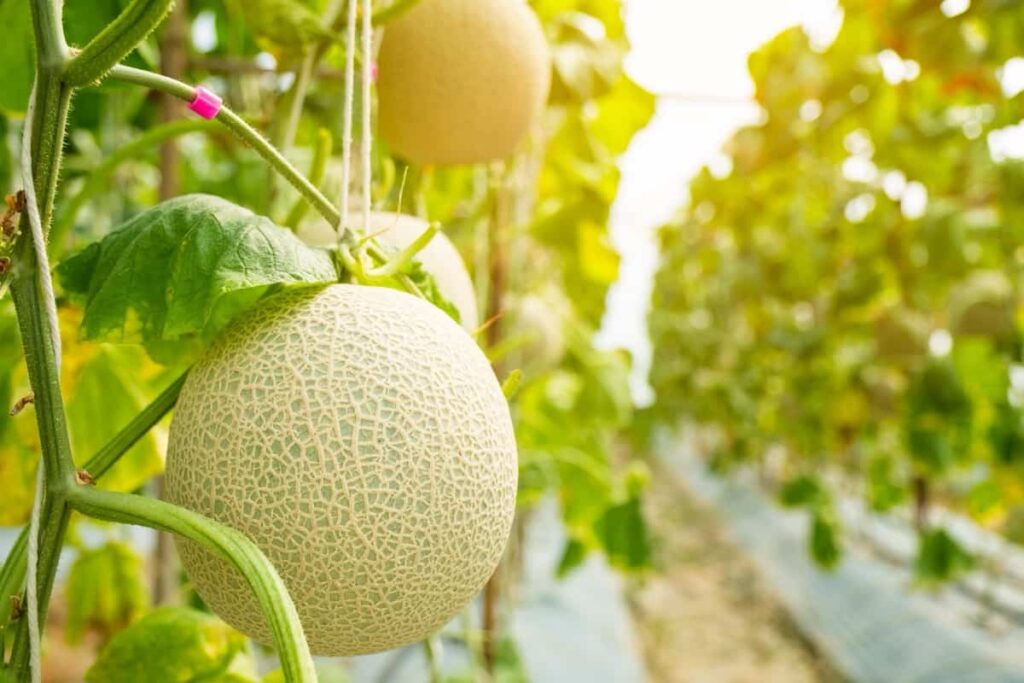
Foliar Feeding for Cantaloupes: Boosting Nutrient Uptake through Leaves
Foliar feeding is a technique that involves applying fertilizer directly to the leaves of plants. This method can be especially beneficial for Cantaloupes, allowing for quick absorption and rapid growth. By spraying a nutrient-rich solution onto the foliage, you can ensure that your Cantaloupe plants get the essential elements they need to thrive. When choosing a fertilizer for foliar feeding Cantaloupes, look for one with a balanced NPK ratio and additional micronutrients like magnesium and zinc.
These elements are crucial for healthy growth and fruit development. Mix your fertilizer with water according to package instructions to apply foliar feedings. Use a sprayer or mister to distribute the solution onto both sides of the leaves evenly. Be sure to spray during cooler parts of the day to prevent leaf burn.
Compost as a Fertilizer for Cantaloupes: Improving Soil Structure and Nutrient Content
Compost is a valuable natural fertilizer that can greatly benefit your Cantaloupe plants. Not only does it improve the soil structure, but it also enhances the nutrient content, providing your plants with essential elements for healthy growth. When added compost to the soil, it helps to retain moisture, prevent erosion, and promote proper drainage. Its rich organic matter improves the soil’s texture and root development in Cantaloupe plants.
In addition to its physical benefits, compost is teeming with beneficial microorganisms that aid in breaking down organic materials and releasing nutrients into the soil. This creates a fertile environment for your Cantaloupes to thrive. To use compost as a fertilizer for Cantaloupes, spread a layer of well-aged compost around the base of each plant. As you water or when rain falls, the roots will gradually absorb nutrients from the compost.
Seaweed Extracts as a Natural Fertilizer for Cantaloupes: Stimulating Growth and Disease Resistance
Seaweed extracts have become a natural fertilizer for Cantaloupes because they stimulate growth and enhance disease resistance. Derived from various seaweed species, these extracts are rich in essential nutrients and bioactive compounds that promote overall plant health. Additionally, seaweed extracts help improve soil structure by increasing its water-holding capacity and enhancing microbial activity. This particularly benefits Cantaloupes as it ensures optimal root development and nutrient absorption.
Fish Emulsion as an Organic Fertilizer for Cantaloupes: Rich in Nutrients and Beneficial Microbes
Fish emulsion is one of the popular organic fertilizers for Cantaloupes. It contains beneficial microbes that can enhance the growth and productivity of your plants. The main advantage of using fish emulsion as a fertilizer for Cantaloupes is its high nutrient content. It balances nitrogen, phosphorus, and potassium (NPK) essential for healthy plant growth. Nitrogen promotes leafy green growth, phosphorus encourages root development and flowering, and potassium helps with overall plant health and disease resistance.
In case you missed it: 15 Best Walk-behind Fertilizer Spreaders with Price List

In addition to NPK, fish emulsion contains other trace elements lke calcium, magnesium, sulfur, and micronutrients like iron, manganese, zinc, and copper – all crucial for optimal plant nutrition. Moreover, fish emulsion is a natural soil conditioner, improving its structure and fertility. The beneficial microbes in the fertilizer help break down soil organic matter into nutrients easily absorbed by the plants’ roots.
Bone Meal Act as a Source of Phosphorus for Cantaloupes: Promoting Root Development and Flowering
Bone meal can be a valuable organic fertilizer when promoting root development and flowering in Cantaloupes. Derived from ground animal bones, bone meal is rich in phosphorus, an essential nutrient for plant growth. Phosphorus plays a crucial role in forming strong roots and vibrant flowers.
By providing this vital nutrient to your Cantaloupe plants through bone meal, you can ensure they have the necessary resources to thrive. The benefit of using bone meal as a source of phosphorus is its slow-release nature. This means the nutrients are released gradually, ensuring a steady supply for your Cantaloupes throughout their growing season. Additionally, bone meal contains calcium and trace minerals that contributing to plant health.
Calcium is important for cell division and structure, while trace minerals support various metabolic processes within the plant. To use bone meal effectively on your Cantaloupes, sprinkle it around the base of each plant before gently working it into the soil. This will allow the plant roots to access the nutrients as they grow readily.
Epsom Salt as a Supplemental Fertilizer for Cantaloupes: Enhancing Fruit Quality and Sweetness
Epsom salt, magnesium sulfate, is a popular and effective supplemental fertilizer for Cantaloupes. Not only does it provide much-needed nutrients to the plants, but it also enhances the overall quality and sweetness of the fruits. The main benefit of using Epsom salt as a fertilizer for Cantaloupes is its high magnesium content. Magnesium plays a crucial role in chlorophyll production, which helps in photosynthesis and overall plant growth.
Supplying enough magnesium through Epsom salt ensures that your Cantaloupe plants are healthy and vibrant. Another advantage of using Epsom salt is its ability to improve fruit quality and sweetness. Magnesium aids in enzyme activation within the plants, promoting better nutrient uptake and metabolism. This results in tastier and more flavorful Cantaloupes that will please your taste buds.
To apply Epsom salt as a fertilizer for Cantaloupes, dissolve it in water according to package instructions and spray or drench the solution around the base of the plants. It’s important not to overdo it, though applying too much Epsom salt can lead to nutrient imbalances or even damage your plants.
In case you missed it: Best Fertilizer for Red Lady Papaya: Schedule of Organic, Liquid, Natural, Homemade, NPK Fertilizers
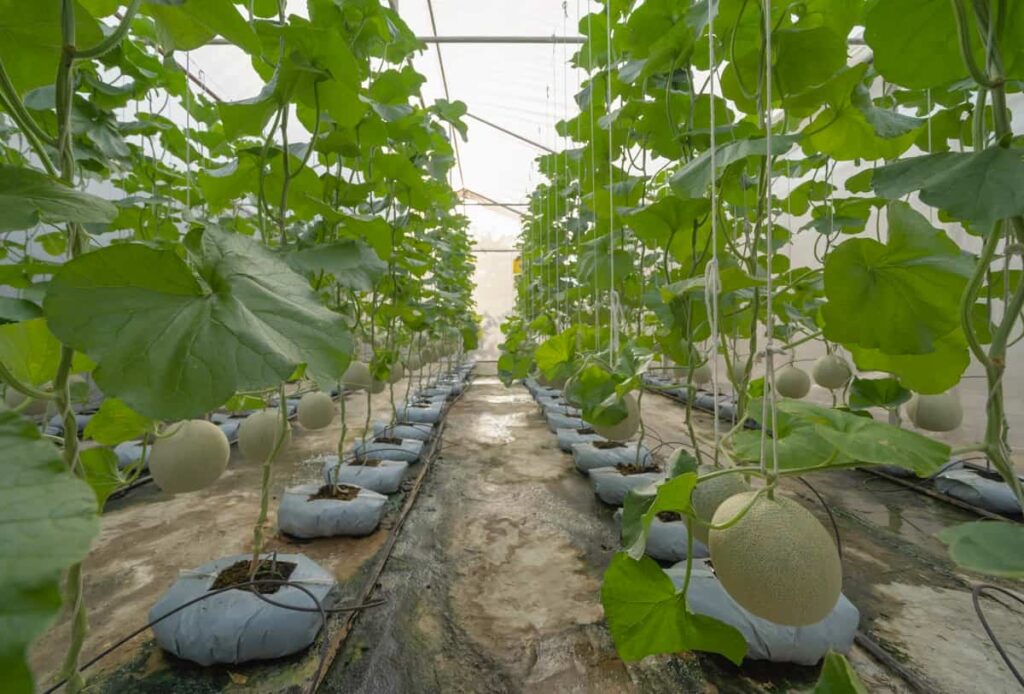
Schedule Table of Best Fertilizer for Cantaloupe: Organic, Natural, Homemade, and NPK Ratio
| Type of Fertilizer | Fertilizer Details | Time to Apply (Schedule) |
| Organic fertilizers | Compost, seaweed extracts, composted poultry litter or manure, worm castings, and blood or bone meal | Once a week after flowering |
| Natural fertilizers | Fish emulsion, banana peel fertilizer | Every two weeks during the growing season |
| Homemade fertilizers | Compost tea, Epsom salt, coffee grounds, eggshells | About a month before the growing season starts |
| Slow-release fertilizers | Various forms, such as coated granules or pellets | A few days before planting |
Conclusion
Fertilizing Cantaloupe plants is essential for their healthy growth and abundant fruit production. To ensure bountiful harvests and mouthwatering melons, you must provide your plants with the best fertilizer for Cantaloupe. You must provide your Cantaloupe plants with the right nutrients to achieve the best results. Fertilization is crucial in the successful growth and development of Cantaloupe plants.
- Management Pests and Diseases in Your Cotton Field
- Sheep Farming Business Plan for Beginners
- Aquaponic Farming at Home: A Step-By-Step Guide
- Profitable Village Farming Business Ideas in 2024
- High-Yield Aquaculture: Fast-Growing Fish for Farming
- Effective Fish Pond Construction Techniques for Beginners
- Irrigation and Water Management in Pineapple Farming
- Blossom to Harvest: Mastering Flowering and Pollination in Papaya Farming
- Pig Fattening Essentials: From Selection to Sale for Beginners
- Raising Wagyu Cattle: A Complete Guide for Premium Beef Production
- Soil Types and Their Water Holding Capacity
- Optimizing Irrigation Schedules for Coconut Groves for Enhanced Yield
- Espresso Your Garden: Coffee Grounds for Healthier Acid-Loving Plants
- The Best Soil Mix for Snake Plants: How to Mix Your Own Snake Plant Soil
- Green Thumb Success: Expert Tips for Cultivating Greenhouse Beans All Year Round
- Bloom All Year Round: The Ultimate Guide to Indoor Hyacinth Care
- Eco-Friendly Gardening: How to Make Liquid Fertilizer from Kitchen Waste
- Ultimate Guide to Grow Anise in Pots: Explore Seed Propagation to Harvesting
- Guide to Raising Chester White Pigs: Discover Breed Facts to Growth Management
- Mastering the Elegance: The Ultimate Guide to Weeping Cherry Tree Care, Planting, and Maintenance
- Ultimate Guide to Planting Garlic in Grow Bags: Growing Strategies for Beginners
- How to Fix Spider Plant Leaf-Related Problems: Natural and Organic Remedies
- 10 Reasons Why Your Tulsi Plant is Shedding Leaves: Home Remedies and Solutions
- Optimizing Growth and Yield: The Advantages of Palm Bunch Ash Fertilizer
- Utilizing Neem Oil Extract as a Natural Pesticide for Hydrangea
- From Soil to Harvest: Various Ways in Which Farmers Can Use AI Tools
- Steps to Encourage and Induce Citrus Flowers: A Comprehensive Guide
- How to Fix Snake Plant Leaf-Related Issues: Natural and Organic Remedies
- Transform Your Garden into a Fragrant Oasis with Raat Ki Rani (Night Blooming Jasmine)
- Discover the Ideal Chicken Breeds for Philippine Farms
- How to Create a Poultry Egg Farm Business Plan for Profits
- Grow Lemon Cucumbers Like a Pro: Insider Techniques for Bountiful Yields
- Ultimate Guide to Caring for Your Pink Princess Philodendron: Tips for Thriving Variegation
- Areca Nut Profit Per Acre: Calculating Yield and Cost of Cultivation
- How Kaveri Chicken is Becoming a More Profitable Breed in Indian Backyards
- Transform Your Barn: 9 Steps to Convert a Horse Stall into a Chicken Coop
